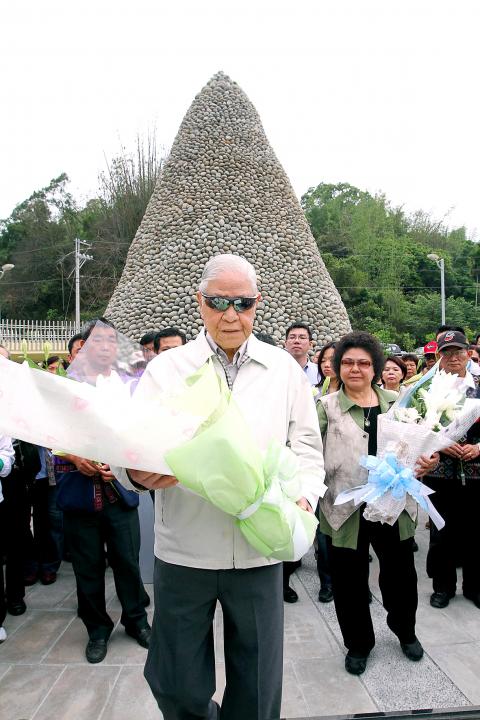Former president Lee Teng-hui (李登輝) yesterday mourned those who perished in the village of Siaolin (小林), Greater Kaohsiung, in 2009 and reiterated the government’s responsibility to care for people’s well-being as he concluded his three-day visit to southern Taiwan.
Lee, in a ceremony held at Siaolin Memorial Park yesterday morning, mourned the 462 people killed at Siaolin, which was wiped out in a landslide when Typhoon Morakot devastated the south of the nation in August 2009.
The 89-year-old said it has always been his wish to pay tribute to the dead in Siaolin and he always has a “heartbroken” feeling whenever he thinks about the tragedy, but he had to wait until he had recovered from surgery for cancer to visit the park.

Photo: Chang Chung-yi, Taipei Times
Accompanied by Kaohsiung Mayor Chen Chu (陳菊) and a group of residents, Lee toured the park and presented bouquets in front of a pyramid-shaped stone memorial.
He praised the rebuilding efforts of the Greater Kaohsiung Government, saying it was able to take care of the survivors by relocating the village and a permanent housing project, as well as commemorating the deceased, including the installation of 462 name plaques for the dead and the planting of 181 trees at the park to symbolize the 181 families that lived in the village.
“Rarely have we seen governments around the world that have been able to rebuild with such efficiency,” he said. “This is what a democratic society is all about. Governments implement every policy with people’s well-being and their benefit in mind.”
That is why he was promoting local autonomy and local governments, as opposed to the centralization of power, during his three-day trip to Pingtung County and Greater Kaohsiung, he said.
The former president on Wednesday and Thursday urged local governments to fight for their power, rights and land, because the central government neither understands the public’s hardships and difficulties, nor listens to public opinion.
Speaking at a plaza in the memorial park against the backdrop of the devastating landslide, Lee said the park “means a lot to me personally.”
Lee said he had visited the area twice now and both visits had symbolic implications.
In 1986, when he served as vice president under then-president Chiang Ching-kuo (蔣經國), Lee, a devout Christian, was given an order to resolve the “Mount Zion controversy,” Lee recalled.
Mount Zion is a 200 hectare mountainous area bought and developed by a New Testament Church in the 1960s.
The church promoted self-government and had a long history of fighting against the Chinese Nationalist Party (KMT) regime, which deployed police and troops to expel worshipers from the area by force, raising human rights concerns.
The visit was the first of a series of trips Lee is scheduled to embark upon, with trips to other parts of the nation being planned.

A preclearance service to facilitate entry for people traveling to select airports in Japan would be available from Thursday next week to Feb. 25 at Taiwan Taoyuan International Airport, Taoyuan International Airport Corp (TIAC) said on Tuesday. The service was first made available to Taiwanese travelers throughout the winter vacation of 2024 and during the Lunar New Year holiday. In addition to flights to the Japanese cities of Hakodate, Asahikawa, Akita, Sendai, Niigata, Okayama, Takamatsu, Kumamoto and Kagoshima, the service would be available to travelers to Kobe and Oita. The service can be accessed by passengers of 15 flight routes operated by

Alain Robert, known as the "French Spider-Man," praised Alex Honnold as exceptionally well-prepared after the US climber completed a free solo ascent of Taipei 101 yesterday. Robert said Honnold's ascent of the 508m-tall skyscraper in just more than one-and-a-half hours without using safety ropes or equipment was a remarkable achievement. "This is my life," he said in an interview conducted in French, adding that he liked the feeling of being "on the edge of danger." The 63-year-old Frenchman climbed Taipei 101 using ropes in December 2004, taking about four hours to reach the top. On a one-to-10 scale of difficulty, Robert said Taipei 101

MORE FALL: An investigation into one of Xi’s key cronies, part of a broader ‘anti-corruption’ drive, indicates that he might have a deep distrust in the military, an expert said China’s latest military purge underscores systemic risks in its shift from collective leadership to sole rule under Chinese President Xi Jinping (習近平), and could disrupt its chain of command and military capabilities, a national security official said yesterday. If decisionmaking within the Chinese Communist Party has become “irrational” under one-man rule, the Taiwan Strait and the regional situation must be approached with extreme caution, given unforeseen risks, they added. The anonymous official made the remarks as China’s Central Military Commission Vice Chairman Zhang Youxia (張又俠) and Joint Staff Department Chief of Staff Liu Zhenli (劉振立) were reportedly being investigated for suspected “serious

Taiwanese and US defense groups are collaborating to introduce deployable, semi-autonomous manufacturing systems for drones and components in a boost to the nation’s supply chain resilience. Taiwan’s G-Tech Optroelectronics Corp subsidiary GTOC and the US’ Aerkomm Inc on Friday announced an agreement with fellow US-based Firestorm Lab to adopt the latter’s xCell, a technology featuring 3D printers fitted in 6.1m container units. The systems enable aerial platforms and parts to be produced in high volumes from dispersed nodes capable of rapid redeployment, to minimize the risk of enemy strikes and to meet field requirements, they said. Firestorm chief technology officer Ian Muceus said